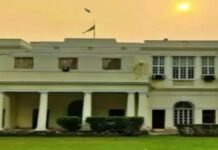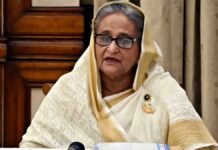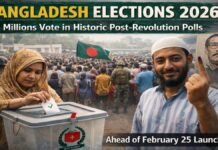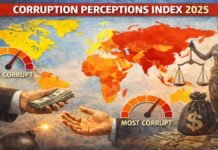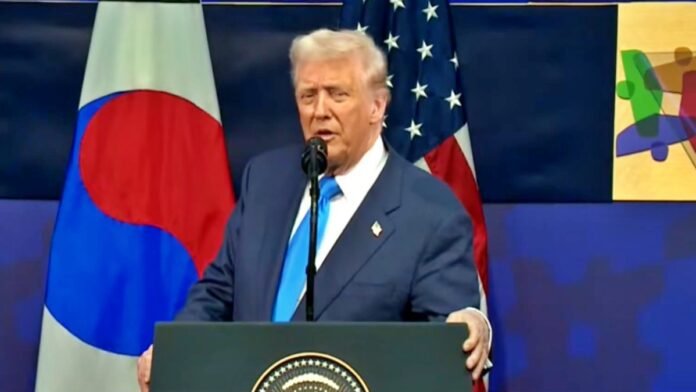
Key Points
- Trump spoke at APEC CEO luncheon in Gyeongju, South Korea on October 28, 2025, repeating claims he stopped India-Pakistan “war” in May
- Called PM Modi “the nicest looking guy” who “looks like a father figure” but is also “a killer” and “tough as hell”
- Claimed he threatened both India and Pakistan with 250% tariffs and refused trade deals unless they stopped fighting
- Alleged “seven planes were shot down” and his intervention “saved millions and millions of lives”
- India has unequivocally denied any US role, stating ceasefire was reached bilaterally through direct military channels
- PM Modi deliberately skipped ASEAN summit in Malaysia to avoid Trump and prevent him from repeating ceasefire claims
- Trump praised Pakistan PM Shehbaz Sharif and Field Marshal Asim Munir, calling the army chief a “great fighter”
- Trump suggested US-India trade deal is imminent: “I am going to do a trade deal with India”
- India currently faces 50% tariffs on exports to US, including 25% penalty for purchasing Russian oil
- This is the latest in repeated claims Trump has made since May, each time with embellished details
Gyeongju(South Korea): Speaking at a luncheon for Asia-Pacific Economic Cooperation business leaders in Gyeongju, South Korea on Wednesday, US President Donald Trump delivered a characteristically colorful and controversial assessment of Indian Prime Minister Narendra Modi. Trump’s remarks mixed effusive praise with provocative characterizations that have sparked debate across political circles in both countries.
“Prime Minister Modi is the nicest-looking guy. He looks like someone you’d want to have as your father,” Trump told the assembled business leaders, before adding a jarring qualifier: “But he’s a killer, tough as hell”. The juxtaposition of describing Modi as both a paternal figure and a “killer” exemplifies Trump’s unconventional diplomatic style that often blurs compliments with implicit criticisms.
Trump emphasized his personal relationship with the Indian leader, stating: “I am doing a trade deal with India, and I have great respect and love for Prime Minister Modi. We have a great relationship”. He went on to assert confidently: “I am going to do a trade deal with India,” suggesting that bilateral trade negotiations are progressing toward an agreement.
The US President also extended praise to Pakistani leadership, describing Prime Minister Shehbaz Sharif as “a great guy” and lauding Field Marshal Asim Munir, Pakistan’s army chief, as “a great fighter”. Trump characterized both nations’ leaders as “strong people” who were initially resistant to his mediation efforts.
Trump’s Version of Events: 250% Tariff Threats
Trump provided a detailed though disputed account of how he claims to have intervened in the India-Pakistan conflict that occurred in May 2025. According to his narrative, he used the leverage of trade negotiations and the threat of punitive tariffs to force both nuclear-armed nations to cease hostilities.
“I’m reading that seven planes were shot down. These are two nuclear nations, and they’re really going at it,” Trump recounted, painting a picture of escalating military conflict. He claimed he then initiated phone calls to both Prime Minister Modi and the Pakistani leadership to deliver an ultimatum.
“I called Prime Minister Modi and said, ‘We can’t make a trade deal with you. No, no, we must make a trade deal.’ I said, ‘No, we can’t. You’re starting a war with Pakistan. We’re not going to do it,” Trump stated. According to his account, he delivered an identical message to Pakistani officials: “Then I called Pakistan and said, ‘We’re not going to do trade with you because you’re fighting with India'”.
Trump claimed both leaders initially resisted his pressure. “They said, ‘No, no, you should let us fight.’ They both said that. They’re strong people,” he recounted. Trump then attempted to impersonate Modi’s response, saying in an exaggerated accent: “No, we will fight!”. Trump expressed mock surprise: “I said, ‘Whoa, this is the same man that I know?'”.
The President then described escalating his economic threats to achieve compliance. “I was warned about the tariffs. I said I was going to put 250% tariffs on each country, which means that you’ll never do business,” Trump explained. He elaborated: “In other words, there’s nothing you can sell for 250%. That means that’s a nice way of saying we don’t want to do business with you”.
According to Trump’s account, this strategy proved effective within 48 hours. “After literally two days, they called up and they said, ‘We understand,’ and they stopped fighting. How is that? Isn’t that amazing?” Trump asked rhetorically. He concluded with a political jab: “Now, you think Biden would have done that? I don’t think so”.
Trump further claimed his intervention prevented massive casualties: “His intervention ‘saved millions and millions of lives,'” according to his characterization of the situation.
India’s Consistent Denial of US Mediation
India has unequivocally and repeatedly rejected Trump’s narrative that the United States played any role in facilitating the ceasefire with Pakistan in May 2025. The Ministry of External Affairs has consistently maintained that the decision to cease hostilities was reached through direct bilateral military and diplomatic channels with absolutely no third-party involvement or mediation.
As Trump continues his time in office and both nations navigate complex domestic and international challenges, the India-US relationship will require careful management by officials on both sides who understand the strategic importance of the partnership beyond individual personalities or specific policy disagreements.



